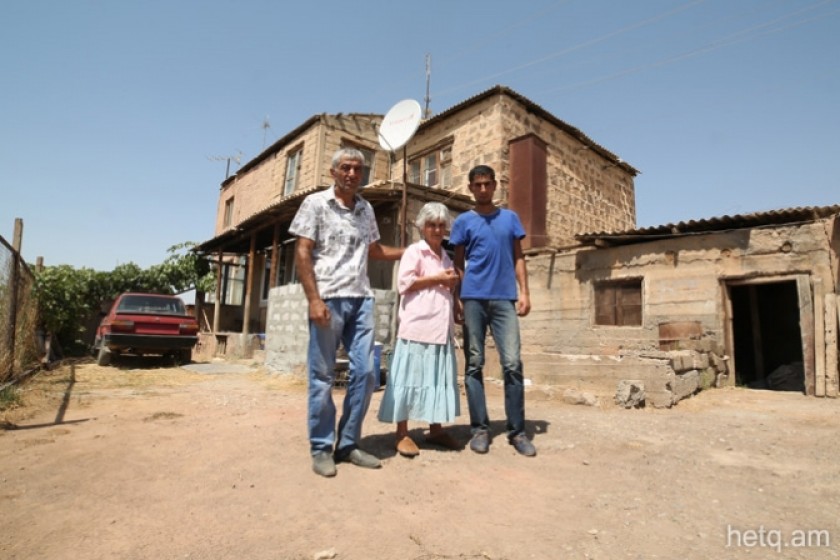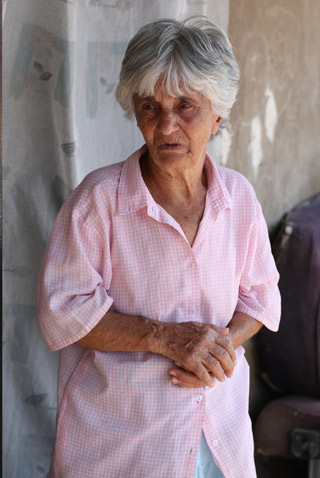
The Story of One House: “From a small dream to great happiness”
We walk down the dusty road in the village of Yeraskh towards the new house of Sergey Stepanyan.
His former edgy demeanor has been replaced by an air of calm. We wonder if we’ve confused him with someone else. All the while, Sergey walks confidently ahead; sometimes smiling.
We ask if he’s grown accustomed to his new house. He says he has. Sergey is a man of few words.
We reach the two story house where four families now live. Sergey lives on the ground floor. We are greeted by his 77 year-old mother Roza Khachatryan. She welcomes us with hugs and kisses. Mrs. Khachatryan says, “You don’t know what you have done for us.” We respond that we were only doing our job as reporters.
 When we last met Roza she was crying and stuttered. Now, with sparkling eyes, she looked straight at us, shuffling her and there, but close enough to follow our conversation with Sergey.
When we last met Roza she was crying and stuttered. Now, with sparkling eyes, she looked straight at us, shuffling her and there, but close enough to follow our conversation with Sergey.
Hetq first met this family on May 9. Sergey Khachatryan had wanted a few tin sheets to repair his roofs that his mother wouldn’t get wet when it rained. Sergey tells us that one week after the Hetq article he got a phone call from the Fuller Housing Center. Later, some people from the Center came to check on the house.
“When they saw the house, they said it couldn’t be renovated and that a new one needed to be purchased,” Sergey tells us, adding all the details of the story.
With support from Hrant Candan, a Fuller benefactor, a $9,000 house was purchased. Improvements were also made. Under the agreement, Sergey must pay 18,000 AMD monthly over the next twenty years. Sergey says stipulation is favorable and that he will have no problem paying. “They gave us a house at no interest and with no down payment,” he says.
The new house has three rooms, two balconies, a shower, animal shed and some land. Sergey has moved in with his wife and mother. One of his three sons, with his family, also lives in the house.
In a hushed voice we ask Sergey if the new house has made a change in his life and if his former sense of despair has been lifted. “There isn’t any despair anymore. To be honest, I’m happy now,” says a smiling Sergey.
On the way to Yeraskh we remembered the letter entitled, “From a small dream to great happiness”, that the Fuller Housing Center had sent to Hetq. So here we are again in Yeraskh walking with Sergey under the scorching summer sun. It’s so hot at midday that our shoes are about to melt.
We walk and talk. Sergey tells us that he’s still working as a day laborer in the watermelon and melon fields. During our last meeting, Sergey complained about the work – it was tough and the pay was low, he said. Today, Sergey seems unperturbed by all that and says he won’t have a problem paying the 18,000 dram ($38) per month. At least that’s what he says now.
“Let’s say that I die before paying it off. My son will continue paying. What’s important is that my mom can now sleep without getting wet,” says the Artsakh War vet.
Later, we tell the family to gather in front of the house for a photo. Sergey embraces his mother and the two break out in smiles.
Sergey’s family is just one of the needy families living in Yeraskh, a village in Ararat Province near the border with Nakhijevan.
In the Soviet era, Yeraskh bustled with life. There were no ‘borders’ then and the fact that the Yerevan-Nakhijevan-Meghri railroad, linking the Soviet Union with Iran, passed through helped as well.
Yeraskh Mayor Radik Oghikyan says, half jokingly, that, “Back then one could even purchase a snake egg in Yeraskh.”
In fact Yeraskh was a manufacturing center that was administratively classified as a town. Now, it’s a village – the last stop on the railroad before entering Azerbaijan.
Just beyond the village are defensive bunkers and the border, where gunfire periodically erupts. But the train still plies the Yerevan-Yeraskh route.
The factories have long since shut down. People make a living from small scale agriculture. The difference between Yeraskh and neighboring Armash is apparent even to a stranger.
On our trip back, sunburned and tired, we take a last look at the village houses. Most are old with decrepit walls and windows caked with dust. It all smells of poverty. Yeraskh, one could say, serves as a microcosm of the poverty afflicting Armenia today.
This thought is further buoyed by the news of a huge and deadly road accident that occurred on August 13 at the Yeraskh roundabout.
The back portion of Iranian semi-trailer carrying fuel broke free and crashed into several cars. The spinning trailer caught fire - killing one and injuring nine.
The fuel flowed from the roundabout down to the train tracks. Local residents mindlessly rushed to the site to scoop up the precious ‘black gold’ with dustpans.
After saying our goodbyes, Sergey and his son rushed to scoop up their share as well.
Photos: Davit Banuchyan
 Videos
Videos Photos
Photos




Write a comment